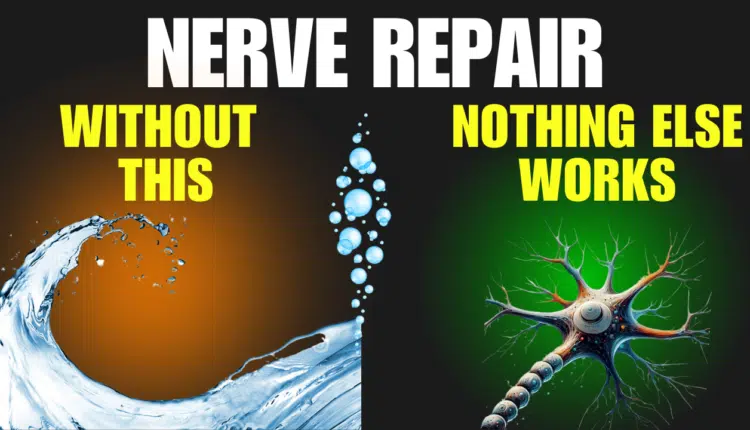The Hidden Link Between Dehydration and Nerve Pain
When people talk about nerve repair, they often focus on diet, supplements, exercise, or sleep, but most do not make the connection between dehydration and pain.
You could eat the best diet, take all the right supplements, and exercise like a pro, but your nerves will struggle to repair and recover without proper hydration.
What is Dehydration?
Have you ever felt brain fog, sluggish nerves, numbness, tingling, or inexplicable nerve pain? Even after trying keto or carnivore diets, supplements, or detoxes, do you still feel like something is off?
Water plays a significant role in many aspects of your daily life, such as
- How well your nerves fire and communicate
- How efficiently your body removes toxins and inflammation
- How fast your nerve cells regenerate and repair
- Energy levels
- Mental alertness
- Mood
- Maintaining focus and mental clarity
When you are dehydrated, your nerves are trapped in slow motion, struggling to recover, and unable to transmit signals properly.
Most people are chronically dehydrated and never realize it.
Dehydration Effects on Brain Fog and Nerve Function
Your nerves work like electrical wires, sending messages from your brain to the rest of your body. Unlike the wires, however, your nerves do not float in dry air but are surrounded by fluids. Without enough water, the signals can become weak or scrambled, leading to slow responses, pain, or numbness.
Beyond the pain it brings, there are various ways that dehydration hinders your nervous system.
Dehydration Slows Electrical Signals
Lack of water intake leads to sluggish electrical signals.
Dehydration Causes Toxin Accumulation
It can also lead to toxin accumulation. Part of water’s job in the body is to flush out inflammatory byproducts that damage nerves. Without enough water, the toxins build up and cause pain.
Dehydration Causes Poor Nutrient Absorption
Furthermore, dehydration also results in poor nutrient absorption, making it harder for your body to absorb nerve-repairing nutrients like magnesium, potassium, R-Alpha Lipoic Acid, and the rest.
Dehydration Fuels Chronic Inflammation
Dehydration also fuels chronic inflammation, slowing down nerve repair.
Dehydration Increases Pain Sensitivity
Dehydrated tissues are more prone to irritation, which amplifies pain signals.
Dehydration Increases Prostaglandins
Dehydration increases prostaglandins, a hormone-like substance involved in pain, fever, and inflammation. Drinking more water helps decrease the pain signals by reducing prostaglandin production.
Dehydration Lowers Cellular Energy
Water is essential for cellular energy production for your mitochondria’s health, providing invaluable fuel for nerve cells.
Dehydration Reduces Mental Focus & Function
Even mild dehydration reduces mental clarity, alertness, and cognitive function, resulting in brain fog and forgetfulness.
Dehydration Increases Mood Imbalances
Studies also linked dehydration to mood imbalances like increased anxiety, stress, and depression.
To fully explain the importance of hydration to nerve recovery, I had a neuropathy patient who made significant progress, but then it stopped. They plateaued with no further improvement at the halfway point of her recovery.
We checked her supplements, photobiomodulation frequency, and exercises, but she did everything correctly.
So, we looked into her lifestyle and discovered she barely drank one glass of water daily. After some discussion, we increased her water intake to up to two liters (64 oz), and she saw continued improvement after two weeks of proper hydration.
So, while many may debate which diet is best, most people neglect what they need most: water.
Filtered vs. Tap Water: What’s Best for Nerve Health?
First and foremost, do not drink tap water. Tap water exposes you to harmful chemicals like chlorine, fluoride, heavy metals, and pharmaceuticals. These substances have significant adverse effects on your nervous system.
Chlorine, meant to kill bacteria, can disrupt gut health and contribute to inflammation. Many studies link fluoride, hailed as a cavity fighter, to neurotoxicity. Heavy metals, like lead and arsenic, sometimes leach into water from old pipes, accumulating in your system and interfering with nerve function.
To prevent the harmful effects of tap water, we recommend a high-quality water filtration system. Pitcher filters like Britta or Pur are not sufficient for filtering all the substances above.
You can find many affordable water filtration systems online, at Home Depot, or Lowe’s.
You can use under-the-sink filter systems like reverse osmosis or a carbon block filter for budget friendly systems. While both are great, I prefer the carbon block filter.
Reverse osmosis systems are so effective in removing contaminants that they often strip out alkalizing minerals like calcium, magnesium, and potassium, leaving the water more acidic; however, some systems come with an optional remineralization stage (which adds back essential minerals).
With a carbon block system, you keep the minerals and have more alkaline water.
If you have a reverse osmosis system, you can add liquid concentrated trace mineral drops like ConcenTrace® to restore the lost minerals.
I recommend Hydroviv, iSpring, and Springwell systems.
Hydration Hacks
First, drink more water. We recommend aiming for at least half your body weight in ounces of filtered, mineral-rich water daily.
Here’s some additional strategies to help you stay well hydrated.
Hydrate First Thing in the Morning
Your body naturally becomes dehydrated overnight. To reset your nervous system, we recommend drinking 16-20 ounces of water first thing in the morning to beat dehydration.
Avoid or Limit Dehydrators
Too much caffeine, alcohol, processed food, and excess salt pull water out of your system, dehydrating you. Furthermore, certain medications, especially diuretics, can also dehydrate you.
If you consume any of these, you may need more than 64 oz of water daily.
Allow Your Body Time to Adjust
People often worry about increasing their water intake because they will have to go to the bathroom all day.
However, after the first few days, your bladder will adjust. Soon, even with the increased intake, you will only need to go every 2-4 hours.
Improve the Taste
Furthermore, many people complain about the taste of water. Specifically, it does not have a taste. The change can be an obstacle if you are used to sugary drinks.
If you struggle with water’s taste, infuse it with berries, cucumbers, oranges, or lemons and limes. These boost your mineral and antioxidant content while hydrating your nerves.
If you want faster nerve recovery, less pain, and better function, start with the most straightforward, cheapest fix and hydrate as your nerves depend on it.
Struggling with Neuropathy?
Dr. Coppola and Dr. Monteiro’s dedication to combating neuropathy is deeply personal, stemming from Dr. Monteiro’s experience with her mother’s severe chemo-induced neuropathy. This personal journey fueled their commitment to develop a systematic, drug-free approach to reversing neuropathy.
They founded the San Antonio Neuropathy Center, where they’ve successfully treated over 18,000 patients over the past two decades. Their acclaimed book, “Defeat Neuropathy Now in Spite of Your Doctor,” along with their neuropathy product line, stands as a testament to their expertise and innovative solutions.
Recognized as leading neuropathy specialists in America, Dr. Coppola and Dr. Monteiro offer a beacon of hope for those diagnosed with this challenging condition. If you or a loved one is seeking relief from neuropathy, reach out to us at 844 400-0101 or email us through our contact page – Click here.
Your path to healing can start today.



Comments are closed, but trackbacks and pingbacks are open.